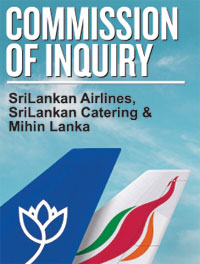News
Misfit directors and over-intrusive politics caused SriLankan’s fall: Witness
Over-intrusive politics and a director board with little or no experience in the industry have been the chief reasons for a maimed national carrier since the 1980s, it was alleged. The allegations were made by Rajeewa Jayaweera, a former SriLankan Country Manager in France and Qatar, while testifying before the Commission of Inquiry (CoI) into irregularities at SriLankan Airlines, SriLankan Catering and Mihin Lanka on Friday.
 He said that, except for the period when SriLankan was managed by Emirates, and during the tenure of an American Chief Executive Officer (CEO) in the late 1980s, the directors’ utter lack of understanding of how the industry worked coupled with their obligation to appease the government at any cost resulted in systematic mismanagement pulling the national carrier down. This continuing ailment reached its peak in the period between 2008 and 2015, following the end of the contract with Emirates.
He said that, except for the period when SriLankan was managed by Emirates, and during the tenure of an American Chief Executive Officer (CEO) in the late 1980s, the directors’ utter lack of understanding of how the industry worked coupled with their obligation to appease the government at any cost resulted in systematic mismanagement pulling the national carrier down. This continuing ailment reached its peak in the period between 2008 and 2015, following the end of the contract with Emirates.
“The government’s interference in staff appointments and promotions, and the low wages paid to workers meant SriLankan was plunged into a situation where it could not attract well qualified employees,” Mr. Jayaweera said. “The CEOs, who were Sri Lankan nationals, lacked knowledge and experience in the aviation industry.”
Commenting on the airline’s marketing strategy, the former country manager said marketing division employees dressed well and spoke in an elegant manner, but their approach was poor and affected dealings with foreign travel and tour operators. The question of SriLankan’s poor marketing approach came up when Mr. Jayaweera was asked why the airline was not able to seize the opportunity and capitalise on the cessation of European carriers to Colombo.
“Theoretically yes, the airline should have capitalised on it, but what happened was different,” he said.
Another factor that crippled the airline was the boom in the market share of Middle Eastern carriers, with Emirates and Qatar Airways leading the way. Adding to this blow was the Sri Lankan Government’s inability or reluctance to be firm on air traffic rights. Air traffic rights comprise the nine freedoms of the air and determine where and how an airline is permitted to operate.
“Traffic rights don’t belong to the airline. They are the property of the state, and it is a government-to-government agreement that determines this. It is part of the two countries’ bilateral agreement,” Mr. Jayaweera said. The government authorities were not strict on this and some flights from Jordan, Lebanon and Oman landed at the BIA without proper permission in the 1980s and 1990s. Nothing was done.
“A country’s interests are more important than those of an airline,” Mr. Jayaweera said. “But the truth is that all these factors combined together caused huge losses, and millions were pumped into this loss-making airline.” He also brought up the issue of excess aircraft. When Mihin Lanka ceased operations due to substantial losses, 10 routes of the budget airline and two of its flights were absorbed by SriLankan. Since these flights were those of a budget airline, the cost to run them by a fully-fledged airline went up. The handling of this issue was inefficient.
Further, when SriLankan suspended its Paris, Rome and Frankfurt routes, many flying hours were saved, the witness stated. “This called for the retirement of at least two aircraft. We had 21 aircraft in 2015/16 and when we ought to have retired three aircraft, three more were added, increasing the fleet to 24 aircraft for 2016/17.”
Meanwhile, another witnessed claimed that Mihin Lanka chose one General Sales Agent (GSA) for each route it flew, despite not having a manual stating so.
The GSA is the airline’s sales representative for a specific country or region. The GSA bags in commissions of 3–5 percent on all tickets and units of cargo space sold in the region it represents.
“We didn’t have a manual for appointing GSAs and never attempted formulating one,” said Rohana Perera, a former head of Mihin’s Commercial Division. “After 2015 they told us to follow the SriLankan’s GSA manual.” Therefore, Mihin CEOs Sajin de Vass Gunawardena (2006-08), Kapila Chandrasena (2008-14), Nishantha Ranatunga (2014-15), Rakitha Jayawardena (2015) and Suren Ratwatte made almost all the appointments themselves, it surfaced.
Mr. Jayaweera earlier said SriLankan Airlines made profits only on a mere six out of 30 plus routes in the financial year 2017/18. He added that the previous year had been worse with only five routes carrying a surplus. “Short routes generated our profits. However, most of these profits were the result of side businesses like ground handling and catering,” he said. “This was the case even when Emirates operated.”
Mr. Jayaweera said that apart from a brief period between February 2002 and December 2004, European routes made continuous losses.
Mr. Jayaweera pointed out that SriLankan did not have a Corporate Planning Division, which takes into account many factors before deciding on new routes or the closure of unprofitable ones.
On Monday, giving evidence before the Commission, Central Bank Governor Indrajit Coomaraswamy elaborated on past and present practices that were adapted by the Central Bank pertaining to the issuance of various debt instruments. Deputy Solicitor General Neil Unamboowe raised concerns over the validity and approval of the Central Bank’s debt department operation manuals issued in 2005 and 2007.
The governor said that, at present, such manuals were prepared by the Public Debt Department (PDD) of the Central Bank and then presented to the Monetary Board for approval. He added that the operational manuals of the PDD would be reviewed and updated, on a yearly basis.

